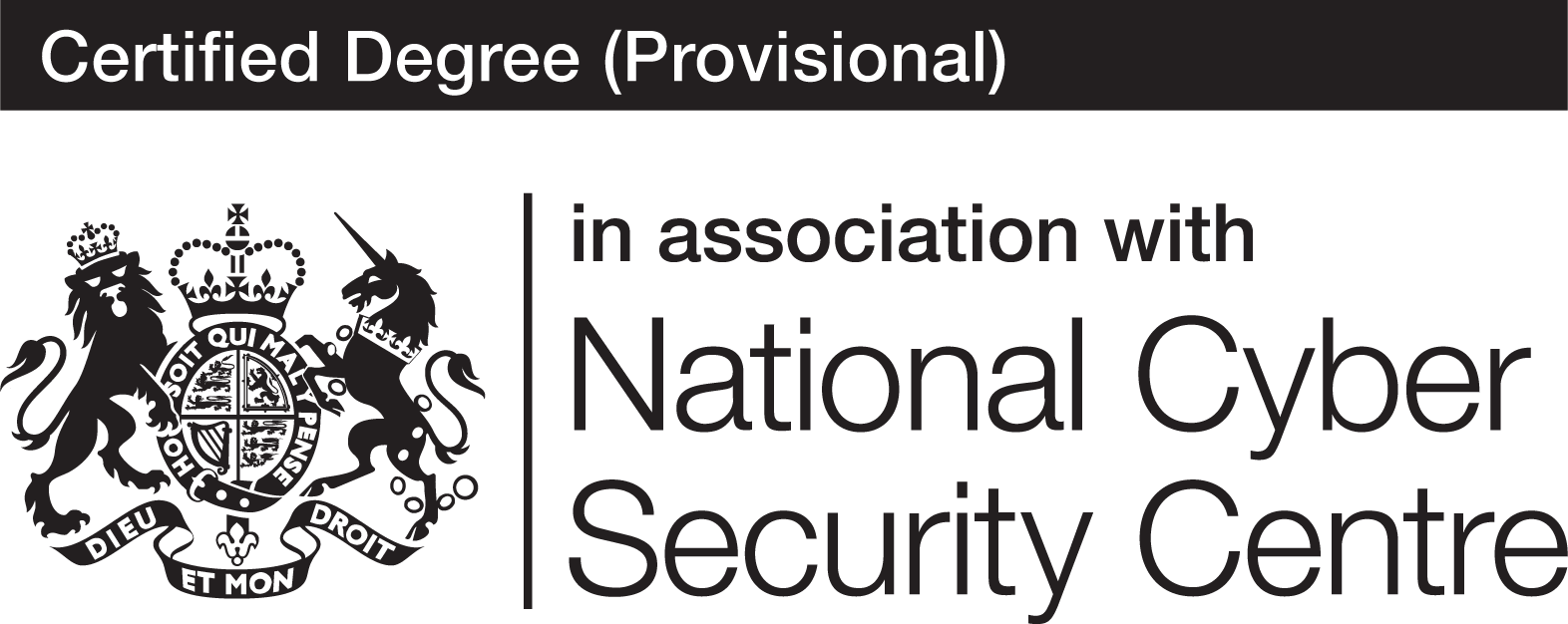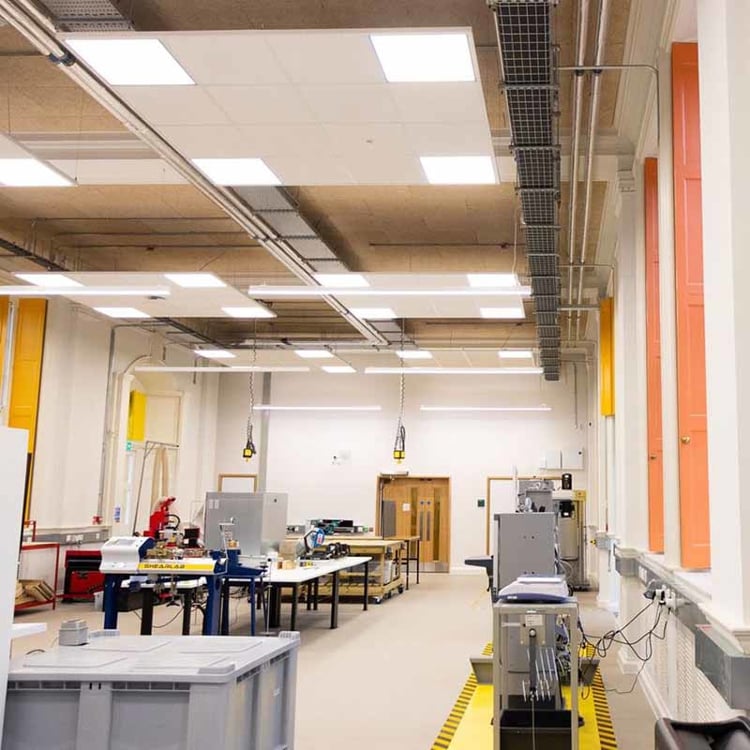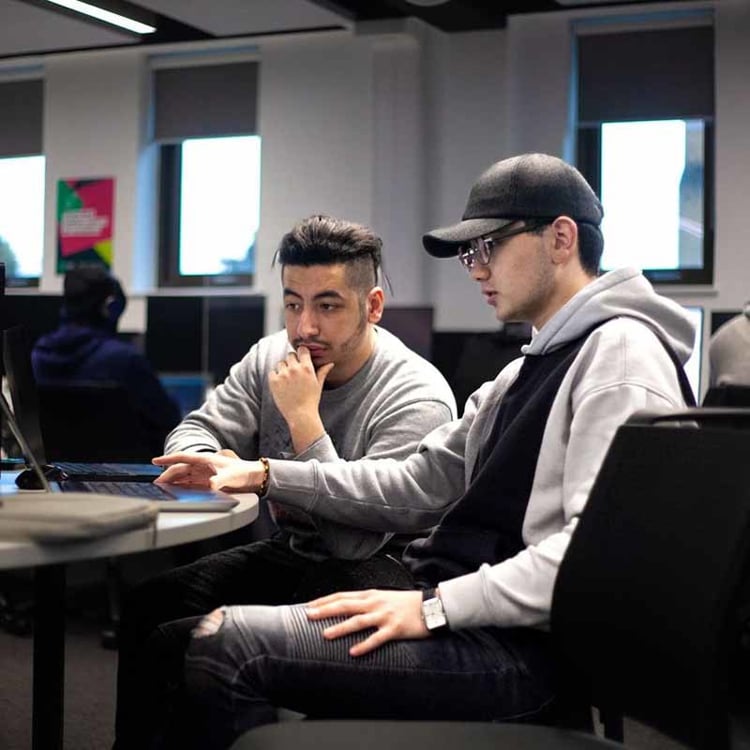Entry tariff:
112–128 UCAS points (or equivalent)
Foundation Year: 64–80 UCAS points (or equivalent)
International Foundation Pathway:
64 UCAS (or equivalent)
IELTS: 5.5
UCAS Code:
I103
I105 (If choosing Foundation Year)
Start date(s):
September 2026
Equip yourself with the in-demand skills to combat cyber threats with our NCSC-recognised cyber security degree. Protect the digital world and join the forefront of cyber security.
Graduate with hands-on experience in cybersecurity operations, AI-driven threat detection, and security testing. Through integrated project-based learning, you'll develop both technical expertise and essential professional skills, while building a comprehensive portfolio that showcases your abilities to employers.
Our programme equips you with practical skills and knowledge to succeed in today’s fast-changing cyber security industry. Aligned with the Cyber Security Body of Knowledge (CYBOK) and NCSC standards, the course covers:
- Technical skills in network security, AI threat detection, and vulnerability assessment using industry monitoring, detection and forensic analysis tools
- Problem-solving and critical thinking to analyse and tackle complex cyber threats, and assess security solutions
- Hands-on offensive (red team) and defensive (blue team) experience including incident response, threat hunting and system hardening
- Understanding of legal, ethical, and professional responsibilities in cyber security
- Teamwork and communication skills to explain security issues to specialist and non-specialist audiences
- Independent learning to keep up with emerging threats and technologies
- Project management skills to plan and deliver successful security projects
You will graduate with a strong portfolio and the confidence to pursue a career in cyber security and technology.

This programme is provisionally certified by the National Cyber Security Centre (NCSC).
This professional recognition is granted to only a select few undergraduate degrees. With many UK universities offering cyber security courses, an NCSC-certified degree stands out by assuring exceptional quality and giving you confidence that your studies will support your future career ambitions.
Be a part of making the online world safer.
This provisional accreditation means you will be part of the effort to make the UK the safest place to live and work online.

Modules
30 credits
This module introduces Computer Science as a professional and academic discipline. You will learn the fundamentals of computer systems and networks and gain practical skills that will be essential for your future in academia and industry.
You will develop and apply your knowledge and skills through a series of practical 'challenges'. Through guided activities, you will be able to recognise and understand the building blocks of the computer-based systems that are prevalent today. Practical skills are complemented by industry case studies through which you will identify and analyse the social, legal, ethical, and environmental impact of computing.
You will have the opportunity to develop your skills and knowledge through activities including:
- Using the command line interface.
- Installing an open-source operating system.
- Creating wired and wireless Local Area Networks (LANs).
- Troubleshooting connected devices, including camera and sound modules.
- Identifying and understanding the fundamental components of a computer (e.g., RAM, CPU, storage).
- Undertaking performance measurement and benchmarking.
- Developing your awareness of cyber security and the foundations of computer systems, including logic and assembly languages.
You will also investigate industry case studies, through which you will gain a breadth of understanding of the place of computer-based systems in industry and society and how professionals can influence issues such as environmental sustainability, equality and diversity, and the global economy.
Teaching and learning
The module is delivered via various activities that you will undertake in small groups in a carousel format. You will be able to prepare in advance for each activity, which will be supported by step-by-step instructions and background content in the form of videos and presentations.
Lecturers and lab demonstrators will help you in class.
Assessment
This module will be assessed by a knowledge-based in-class test (40%) and a journal/reflection, either written or audio/visual presentation (60%).
30 credits
Software development and programming form the foundation of all Computer Science studies, from web development to artificial intelligence. This module introduces you to the main concepts of computational thinking and their translation into the fundamentals of programming.
You will learn to create pseudocode and Python programs while exploring how programming languages provide essential resources such as documentation, libraries, integrated development environments (IDEs), and debugging tools.
The emphasis will be on core programming principles rather than language-specific details; however, Python will be the primary language for class examples, laboratory exercises, and coursework submissions. Python has been chosen for its popularity with employers, widespread use, and its syntax being particularly suitable for novice learners. The module is designed to future-proof your skills and provide a solid foundation in programming for the remainder of your studies.
In addition to technical skills, the module supports you in developing key academic and professional competencies for computing, including finding, evaluating, and using technical information, becoming resourceful, and building resilience as an independent problem-solver. You will also be introduced to the use and integration of artificial intelligence and AI-based tools in programming.
Teaching and learning
Lecturer-led sessions that deliver the key knowledge-based learning outcomes through explanations, live coding demonstrations, worked examples, and individual practice activities.
Hands-on laboratory practice in which you will apply the knowledge areas and develop practical programming skills through guided exercises and problem-solving tasks.
You'll also have 30 minutes of online learning to help you prepare for classes and revision. Material includes video tutorials, code walkthroughs, and interactive presentations.
Assessment
This module will be assessed by a computational problem-solving portfolio (60%) and a live programming challenge with code review (40%).
30 credits
This module introduces you to foundational tools and processes required to develop software applications aimed at specific users. You will cover the basics of designing user interfaces, creating web pages, understanding databases, and linking 'frontend' and 'backend' code.
You will have the opportunity to apply your knowledge from software development to real-world problems and consider the needs of users and stakeholders.
There is a strong focus on databases, including database modelling and design. You will also further develop your programming skills and knowledge of industry best practices, including containerisation, version control, debugging, testing, and coding standards.
By the end of this module, you will have built your own fully functional, user-tested web application from scratch, integrating a database and secure backend logic.
Teaching and learning
The module is delivered via a series of practical lab sessions based on weekly tasks and supported by screencasts and online coding resources that develop your skills and knowledge.
The module employs a project-based approach to build the foundational knowledge and practical skills students need. This structure ensures you not only understand the general importance of the material but also gain hands-on experience applying core concepts.
Assessment
This module will be assessed by coursework (40%) and web application (60%).
30 credits
This module introduces you to the mathematical and algorithmic foundations that power Computer Science. You will explore how mathematical reasoning shapes the way computers solve problems, learning to express real-world challenges in precise, logical, and computable forms.
Through an engaging mix of lectures, seminars, and practical labs, you will build confidence in key areas such as logic, set theory, proof techniques, and discrete mathematical structures. These ideas form the backbone of algorithm design, from creating efficient data structures to developing algorithms for optimization, automation, and data processing.
The module nurtures your computational thinking, analytical precision, and creative problem-solving skills, showing how mathematical concepts translate directly into the ability to design intelligent solutions for complex digital problems.
By the end of this module, you will be able to:
- Understand the core mathematical concepts that underpin Computer Science.
- Recognise how discrete structures represent and organise data.
- Design, analyse, and evaluate algorithms for real-world applications.
- Apply logical and mathematical reasoning to develop reliable computational solutions.
- Appreciate the importance of expressing problems mathematically so that they can be solved algorithmically.
- Develop the confidence to approach computing challenges with creativity, structure, and precision.
Ultimately, this module bridges mathematical theory and algorithmic practice, helping you see how abstract ideas can drive innovation and problem-solving in today's digital world. You will develop an appreciation for and practical skills in the core logic and reasoning that underpins everything from encryption to artificial intelligence.
Teaching and learning
The module employs a problem-centric pedagogical approach, introducing mathematical concepts and methods through practical programming exercises and applied problem-solving.
This approach explicitly connects learning activities to assessment criteria, enabling you to recognise and apply your developing mathematical knowledge in computing contexts.
Assessment
This module will be assessed by an in-class test (50%) and a algorithm design project (50%).
These are the current planned modules on this course and may be subject to change.
30 credits
This module builds upon foundational computing knowledge to develop technical competencies in networks and operating systems. You will gain understanding of the infrastructure that underpins modern digital environments, cloud services, and enterprise IT operations. The module emphasises both theoretical principles and practical implementation skills essential for professional IT practice.
Building on introductory computing concepts from Level 4, this module is delivered through integrated theoretical instruction and extensive hands-on laboratory work.
You will develop professional-level skills in network design, configuration, and management, alongside comprehensive understanding of operating system architecture, administration, and security hardening.
The module prepares you to address complex real-world challenges in enterprise IT environments and positions you for advanced study in specialised areas such as cloud computing, cybersecurity, and systems engineering.
Teaching and learning
This module adopts a project-centred, active learning approach designed to foster technical problem-solving, critical evaluation of infrastructure solutions, and professional application of networking and systems administration principles. The teaching strategy integrates theoretical seminars with practical workshops, supported by structured independent study and comprehensive formative feedback opportunities.
Seminars introduce networking and operating systems concepts, principles, and industry best practices, whilst workshops provide hands-on experience with network configuration, system administration tasks, security implementation, and troubleshooting exercises.
Assessment
This module will be assessed by laboratory-based coursework (60%) and a team-based network and systems integration project (40%).
30 credits
This module provides you with foundational knowledge and practical skills to conduct professional digital investigations in a variety of contexts. It introduces the principal of cyber forensics, providing technical, legal, and ethical foundations of digital forensics, while developing core competencies in evidence acquisition, forensic analysis, and reporting.
You will work with tools such as Autopsy, FTK Imager, Wireshark, Jadx and Volatility to examine digital artefacts across multiple platforms including Windows, Linux, and Android.
Teaching and learning
Through hands-on lab activities, you will examine different file types, file systems, metadata, logs, network files and volatile memory and respond to incident scenarios. The module incorporates international standards such as ISO/IEC 27037 and aligns with the National Cyber Security Centre (NCSC) guidelines and the Cyber Body of Knowledge (CyBOK).
This module adopts a workshop-centred teaching and learning approach, where you will collaborate in a small group during lab sessions.
This strategy blends practical exercises, problem-based technical challenges, and bite-sized lectures, all enriched by group discussions and guided independent study.
To enhance engagement and deepen understanding, you will complete pre-workshop preparation through flipped learning elements, including short videos, learning resources (e.g., O'Reilly), and game-style quizzes via Moodle. Through real-world case studies and group practical exercises you will gain core understanding and implementing digital forensic process and understanding the complexities of incident response activities.
Assessment
This module will be assessed by lab activities-based coursework (50%) and digital forensics report coursework (50%).
30 credits
This module introduces you with essential knowledge and practical skills for systematically assessing the security of a target system, as well as effectively communicating identified vulnerabilities to diverse stakeholders. You will learn the technical and procedural aspects of ethical hacking while developing competencies in security testing, and systems hardening practices using industry-standard frameworks and methodologies.
The module integrates theoretical security principles with hands-on implementation, covering four core domains Build Reviews, system hardening, web application testing, and infrastructure testing. Through structured laboratory exercises you will have progressively developed capabilities including vulnerability assessments, manual exploitation of web application flaws, defence-in-depth implementation and professional penetration testing report writing.
A critical component addresses the legal boundaries of security testing, examining legislation such as the Computer Misuse Act 1990, authorisation requirements, responsible disclosure practices, and professional codes of conduct. The module also aligns with multiple frameworks including OWASP (Top 10, Web Security Testing Guide) and NIST (Cyber Security Framework).
Through authentic case studies spanning web applications, enterprise networks, and IoT devices, you will develop professional competencies in balancing technical thoroughness with business impact, communicating findings to technical and non-technical audiences, and providing actionable remediation guidance.
Teaching and learning
This module adopts a workshop-centred, active learning approach designed to foster collaboration, problem-solving, and student-led engagement. The teaching strategy combines hands-on practical exercises, CTF-style challenges, and bite-sized lectures, supported by group discussions, and guided independent study.
Assessment
This module will be assessed by coursework (60%) and a practical in-class test (40%).
30 credits
This module provides advanced knowledge and practical skills in operational security and network defence, with a strong focus on continuous monitoring, threat detection, and response activities. You will develop practical, hands-on skills in managing security operations centres (SOCs), implementing security information and event management (SIEM), and executing effective incident response and threat hunting procedures.
Through this module, you will gain proficiency in defensive cyber security strategies grounded in widely recognised industry frameworks and knowledge bases, including NIST (National Institute of Standards and Technology), MITRE ATT&CK and risk management standards.
Through hands-on lab activities you will practice the application of security controls within realistic operational environments, enabling you to analyse network traffic, correlate security logs, model threats, and orchestrate automated security responses to real-world security challenges.
The module content has been carefully designed in accordance with NCSC (National Cyber Security Centre) requirements and is based on the Cyber Security Body of Knowledge (CYBOK), ensuring alignment with industry standards and best practices.
Teaching and learning
The module adopts a workshop-centred teaching and learning approach, designed to foster an active, collaborative, and student-led learning environment. The strategy integrates practical exercises, problem-based technical challenges, and bite-sized lectures, all supported by group discussions and guided independent study.
Active sessions and computing lab activities are used to introduce, develop, and consolidate understanding of new key topics while an accompanying carefully designed programme of directed study focuses on examples of application and opportunities to acquire deeper insight.
Assessment
This module will be assessed by group coursework, a security operations project (60%) and an in-class test (40%).
These are the current planned modules on this course and may be subject to change.
This course offers all students the option of a one-year paid work placement, to boost your employability even further. If you choose this route, you will take the placement following year two of your course, and then return to complete your degree.
Why take a placement?
A placement year is the perfect opportunity to gain valuable work experience, to build on the career skills we will teach you on this degree. The connections you make on the placement will improve your career prospects further, and equip you with the skills you need to secure graduate-level employment.
How we support you
The University's Placement and Work Experience Team are experts at helping you to secure a placement. They will work closely with you from the start, helping you research potential employers, discover placement opportunities, create and pitch your CV, and will coach you to perform well in interviews. We aren't able to guarantee a placement, but our sector-leading advisors will give you the best possible chance of securing one.
Find out more about how we'll support you
We understand that your plans might change once you start your programme. If you decide not to do a placement, you will have the option of completing the three year version of your programme.
Whatever your choice, you will have access to many opportunities for work experience through our Placement and Work Experience Team, and access to face-to-face and 24/7 online careers support.
30 credits
This module provides both theoretical foundations and practical insights, preparing you to address current and emerging security threats in cloud environments and empowering you to develop resilient, compliant, and secure cloud systems.
This module is designed to equip you with a comprehensive understanding of security principles and practices specific to cloud computing environments. As organisations increasingly rely on cloud services to store, process, and manage critical data, ensuring the security and integrity of cloud systems has become paramount. Making this module an essential part of addressing security concerns in cloud design, implementation, and adoption
You will explore the fundamental concepts of cloud security architecture, data protection, threat management, and compliance issues. you will analyse real-world security challenges, evaluate security frameworks and tools, and develop practical skills in designing, implementing, and assessing secure cloud solutions.
Teaching and learning
The module adopts a workshop centred approach, integrating theoretical foundations with practical application. Teaching combines bite-sized lectures, problem-based technical challenges, and hands-on exercises, supported by group discussions and guided independent study.
You will work with a cloud environment such as AWS through hands-on lab activities while adopting cloud-native tools such as Kubernetes, Terraform, and others that enable secure multiple cloud platforms, including Azure and Oracle.
Assessment
This module will be assessed through lab activities-based coursework (60%) and in-class test (40%).
30 credits
This module is designed to develop the professional skills and mindset needed to succeed in technology-related careers, alongside enhancing your research and academic skills.
Taking key emerging technologies and current professional issues within your chosen pathway as a starting point, you will define and develop your own area for enquiry. You will be supported to systematically find and analyse academic and industry research publications and review existing technical solutions relevant to your area.
You will return to key topics in professional practice, including project lifecycle management, professional frameworks, agile and traditional methodologies, technical communication, ethical and legal considerations with deeper understanding, and apply these to your own project. You’ll also engage with global perspectives and inclusive practices relevant to your discipline.
Teaching and learning
Your learning will be active and applied. In class, you’ll participate in seminars, lab-based workshops, and project supervision sessions. Outside the classroom, you’ll conduct independent research, collaborate with peers, and use industry-standard tools such as Git, Trello, and JIRA to manage your work.
Each week includes a four-hour teaching session, structured as:
- Interactive keynote discussion - introducing key concepts, frameworks, and professional contexts.
- Guided workshop activities - hands-on practice with tools, methods, and scenarios; individual and collaborative problem-solving.
You will begin to engage with outside stakeholders relevant to your project and apply your knowledge and skills in user research and requirements gathering.
Assessment
This module will be assessed through coursework, where you will prepare a literature review on a chosen topic (50%) and poster project proposal with a Q&A session (50%).
30 credits
Designing, building, deploying, and maintaining secure software in today’s digitally connected world presents significant challenges. Traditional software development often prioritises features and functionality over security, leaving systems vulnerable to exploitation. This module addresses these challenges by introducing you to the principles of security by design and the integration of artificial intelligence (AI) into secure development practices.
Throughout this module you will gain both theoretical knowledge and practical skills to apply Secure Software Development Lifecycle (SSDL) frameworks across the entire development process, from requirements gathering and solution design to coding, testing, deployment, and implement secure coding practices to prevent common vulnerabilities. Emphasis will be placed on embedding security considerations at every stage.
The module covers both Static Application Security Testing (SAST) and Dynamic Application Security Testing (DAST), enabling you to identify, analyse, and remediate security weaknesses at different stages of development. You will explore how AI and machine learning technologies are transforming vulnerability detection and security testing, while critically examining AI's dual role as both a security enabler and potential attack vector.
Teaching and learning
This module adopts a workshop focused teaching and learning approach, designed to foster an active, collaborative, and student-led learning environment. The strategy blends hands-on practical exercises, problem-based learning, and bite-sized lectures, all supported by group discussions and guided independent study.
Active sessions and computing labs are used to introduce, develop, and consolidate understanding of new key topics while accompanying carefully designed learning materials of directed study focuses on examples of application to acquire deeper insight.
Weekly workshops provide you with hands-on experience in secure software development. Working both individually and collaboratively in teams, you will use industry-standard tools and techniques to identify, assess, and mitigate vulnerabilities in software systems. Under the guidance of the lecturer, you will compare approaches, share insights, and develop strategies that directly support your coursework and project assessments.
Assessment
This module will be assessed through coursework, software security assessment video and written document (50%) and coursework on AI based software design and documentation (40%).
30 credits
The Capstone Project provides you with the essential opportunity to deeply explore a subject of high personal interest, situated within the context of your overall programme of study.
You are expected to apply and synthesise your professional practice and research capabilities throughout this project. By bringing these skills together, you will conduct a substantial investigation that extends and demonstrates your practical and academic knowledge. Upon completion, you will produce a significant technical artifact alongside a detailed report.
Building on the Professional Practice in Technology module, you will be able to critically engage with current literature and established research methodologies. Using the knowledge and feedback gained from this module, you will be equipped to develop your research question or problem statement. This work will lead you to systematically evaluate relevant sources, creating a strong foundation for your investigation.
Implementing knowledge gained from the earlier module will enable you to strengthen your methodological approach and demonstrate advanced research and problem-solving skills in your capstone project. You will be able to design and implement an evidence-based solution that addresses your research question and stated objectives. The project culminates in a critical evaluation and reflection on the impact of your solution in relation to your original research goals.
You will be assigned a named individual supervisor who will provide expert guidance throughout your project. While your supervisor is key, you are strongly encouraged to access the full range of academic and research support systems available across the university to enhance your work.
Collaboration is often a feature of the Capstone Project: you may either work with external stakeholders who provide a real-world project brief, or you may have the chance to work alongside an academic, contributing directly to their ongoing research. This project is not undertaken in isolation; peer support is fundamental, and your Capstone Project is developed within a strong, supportive learning community of both staff and fellow students.
Teaching and learning
The module is delivered via three modes of study:
- On-campus sessions that help you conform to the necessary timeline and project requirements
- One-to-one feedback from a named supervisor
- Independent study
The on-campus sessions provide practical activities which directly contribute to the students’ project deliverables.
Peer support via on-campus session activities and group supervisory meetings is strongly encouraged and rewarded via digital badges in Moodle.
Assessment
This module will be assessed by a feedback-feedforward and Q&A session (30%) and a report and artefact (70%).
These are the current planned modules on this course and may be subject to change.
This course offers a foundation year, which takes place at the beginning of your studies. Studying a foundation year will give you academic and practical experience, and a strong introduction to your subject, ensuring you succeed on your undergraduate degree.
30 credits
You will develop your core academic and integrated English language skills of speaking, listening, reading and writing. You will become familiar with key academic skills and concepts, such as referencing methods and awareness of academic integrity and tone. You will apply these skills and knowledge to both broad topics and also your chosen subject pathway.
Teaching and learning
You will be required to actively engage in on-campus learning for up to 10 hours a week.
You will be taught through a full range of teaching and learning methods, which include lectures, seminars, workshops, discussion groups, group directed tasks and presentations. This will enable you to learn from your peers and tutors in both structured and information settings.
You will be encouraged to think creatively about your approach to learning and discussions with your peers. You will also have access to recordings, resources, links and signposting through Moodle to enrich your learning.
Assessment
You will be assessed through group and individual presentations, comparative and reflective essays, multiple choice exams, coursework and reports, oral exams, portfolios, case studies and blogs.
30 credits
You will develop your core academic and integrated English language skills of speaking, listening, reading and writing. You will become familiar with key academic skills and concepts, such as referencing methods and awareness of academic integrity and tone. You will apply these skills and knowledge to both broad topics and also your chosen subject pathway.
Teaching and Learning
You will be required to actively engage in on-campus learning for up to 10 hours a week.
You will be taught through a full range of teaching and learning methods, which include lectures, seminars, workshops, discussion groups, group directed tasks and presentations. This will enable you to learn from your peers and tutors in both structured and information settings.
You will be encouraged to think creatively about your approach to learning and discussions with your peers. You will also have access to recordings, resources, links and signposting through Moodle to enrich your learning.
Assessment
You will be assessed through group and individual presentations, comparative and reflective essays, multiple choice exams, coursework and reports, oral exams, portfolios, case studies and blogs.
30 credits
You will develop your research, numeracy and information technology skills. You will investigate the difference between primary and secondary research, conduct your own research project and demonstrate your findings through data analysis. You will also develop your awareness of equality, diversion and inclusion in the UK, through a real-world issue; discrimination in the workplace.
Teaching and learning
You will be required to actively engage in on-campus learning for up to 10 hours a week.
You will be taught through a full range of teaching and learning methods, which include lectures, seminars, workshops, discussion groups, group directed tasks and presentations. This will enable you to learn from your peers and tutors in both structured and information settings.
You will be encouraged to think creatively about your approach to learning and discussions with your peers. You will also have access to recordings, resources, links and signposting through Moodle to enrich your learning.
Assessment
You will be assessed through group and individual presentations, comparative and reflective essays, multiple choice exams, coursework and reports, oral exams, portfolios, case studies and blogs.
30 credits
You will be taught about how the use of computing software impacts the environment from day-to-day activity through use of business and everyday jobs. This is through the excessive use of computing software as well as the changing way that society operates. You will be encouraged to engage in debates and discussions regarding energy consumption in the use of computing software, in terms of the amount of use as well as the type of materials utilised. You will be encouraged to look at responsible innovation and software impact and the long-term effects this may have.
You will look at how the increased use of IT and computing has contributed to the significant development of globalisation in the interconnectivity and internationalisation of the job market. Discussions on how globalisation has contributed to the international development of education, technology development and the emerging market economies through operating systems and internet operations. This is also linked to their assignment in the international platform of Linked In in developing their e-portfolio.
Teaching and learning
The teaching delivery for each module consists of one, one-three-hour lecture and one, two-hour lab session each week with pair and group work.
There will also be a 30-minute weekly virtual task and multiple-choice quizzes.
Assessment
This module will be assessed using a multiple-choice test and online portfolio.
40% - multiple choice test, which will take place online during a class.
60% - online portfolio, in this written task you will create a blog post, which reports on an individual data research and processing project. You will also create a LinkedIn profile and subject weekly learning journal entries.
30 credits
This module focuses on how to solve problems via program development. The module initially builds your understanding of logic, before teaching you how to develop algorithms. The latter half of the module focuses on programming using a Visual Programming Language (VPL) such as Android App Inventor or Google’s Blockly. The module ends with a discussion on the limits of computation, including data representation and physical limitations.
You will be taught about how the use of computing software impacts the environment from day-to-day activity through use of business and everyday jobs. This is through the excessive use of computing software as well as the changing way that society operates. You will be encouraged to engage in debates and discussions regarding energy consumption in the use of computing software, in terms of amount of use as well as type of materials utilised. You will look at responsible innovation and software impact and the long-term effects this may have.
The module explores how advancements in computing and IT have accelerated globalisation by enhancing interconnectivity, transforming industries, and expanding access to information. You will examine the role of computational thinking and problem-solving in a global context, including the impact of software development, and automation on international markets. Discussions will focus on how programming and algorithm design contribute to technological advancements, remote collaboration, and the evolving global job market. Additionally, you will be able to engage with international computing standards and digital platforms, such as LinkedIn, to develop your profile and understand the significance of global networking in the technology sector.
Teaching and learning
The teaching delivery for each module consists of one, one-three-hour lecture and one, two-hour lab session each week with pair and group work.
There will also be a 30-minute weekly virtual task and multiple-choice quizzes.
Assessment
This module will be assessed using programming coursework and a class test.
60% - coursework, you will design a simple algorithm to solve a problem using flowcharts and pseudocode.
40% - class test, you will construct a program to solve using a Visual Programming Language.
These are the current planned modules on this course and may be subject to change.
Career
This programme is designed to address critical skills shortages in the tech sector and empower you to succeed.
You’ll gain industry-aligned skills that open the door to a wide range of career paths in cybersecurity and the broader technology industry.
Potential roles include:
- Cybersecurity Analyst – Monitor and defend systems against cyber threats
- Security Operations Centre (SOC) Analyst – Respond to incidents and support real-time threat detection
- Vulnerability Tester – Identify and assess security weaknesses in digital systems
- Penetration Tester – Simulate cyberattacks to uncover and fix vulnerabilities
- Risk and Compliance Specialist – Ensure systems meet regulatory and security standards
- Cloud Security Specialist – Protect cloud-based infrastructures and services.
Graduate prepared to thrive in a fast-paced, high-demand field, equipped with the technical and professional skills employers need.

The Student Futures team is here to support you throughout your time at Roehampton and beyond.
They offer services tailored to your needs, helping you take confident steps towards your future.
You’ll have access to a wide range of career workshops and events, where you can engage with employers and develop the skills you need to succeed in the workplace.
These opportunities will help you build your CV, prepare for interviews, and connect with successful Roehampton graduates who are thriving in their careers. You’ll also be able to engage with our partners across London and beyond.
Wherever you want to go in the future, you'll be preparing for the world of work from your very first day.

“The support from my lecturers, particularly as an international student, has been phenomenal — they’ve offered advice, guidance, and a compassionate ear through every hurdle.”
— Athena, BSc Cyber Security student
Learning and Assessment
Our BSc in Cyber Security is built around active, hands-on learning.
You'll work closely with lecturers and peers in interactive classes, tackling real-world technology challenges through collaborative projects and game-style activities. Our inclusive, supportive environment encourages you to learn by doing, helping you build confidence alongside technical and professional skills.
Assessment is just as practical as the learning experience. Rather than relying solely on exams, we use a variety of real-world methods designed to develop and showcase your abilities - ensuring you graduate with the experience, competencies, and confidence employers are looking for.
How you’ll learn
Our BSc in Cyber Security is designed around how professionals actually work - through collaboration, hands-on problem-solving, and practical application.
You’ll learn in a dynamic, supportive environment guided by expert faculty with real-world experience. Instead of passively listening to lectures, you’ll be actively building the skills that employers value most.
Here’s how you’ll learn:
- Workshop-centred learning – Get involved in hands-on, practical workshops that replace traditional lectures and promote active participation.
- Collaborative learning – Work in teams to solve real-world challenges, developing both technical and communication skills.
- Competency-based learning – This approach ensures you learn key technical skills at your own pace, focusing on what you can do - not just what you know. You will progress by demonstrating real abilities through practical tasks, projects, and assessments aligned with industry standards.
- Personalised lab activities – Take part in technical lab sessions tailored to your learning needs where teaching teams are on hand to guide you through technology tools and techniques at your own pace.
- Industry-standard tools – Use professional software, development environments, and simulation tools to build authentic experience.
- Project-based learning – Apply your knowledge to real technology scenarios, working on meaningful challenges that build your confidence and prepare you for industry.
- Flexible learning materials – Access videos, quizzes, and online resources in advance so you can study at your own pace and come to sessions ready to engage.
With guidance from academics and industry professionals, you'll develop not just theoretical knowledge, but the practical skills and critical thinking needed for success in the fast-moving world of cybersecurity.

How you'll be assessed
Assessment on the BSc Cyber Security is designed to reflect the realities of professional practice.
From hands-on problem-solving to in-depth analysis and collaborative projects, each assessment is crafted to develop your skills and build your confidence.
Assessment types include:
- Practical assignments – Tackle cyber security problems under realistic conditions, testing your ability to think critically and act decisively.
- Lab-based coursework – Apply tools and techniques in technical lab tasks, followed by analysis and reflection to reinforce your understanding.
- Report writing and analysis – Investigate security issues and communicate your findings through structured, professional-level reports, reports, developing your ability to analyse data, evaluate risks, and present professional-level documentation.
- Real-world based coursework – Solve practical challenges that mirror those faced by cyber security professionals.
- Gamified assessments – Engage in interactive, game-style challenges that test your problem-solving and technical abilities.
- Project-based assessments – Through these assessments, including a capstone final year project you will apply your cyber security knowledge to real-world problems, designing and delivering solutions that showcase your technical skills, creativity and readiness for professional practice.
- Group work assessments – Collaborate in simulated cyber security environments.
These varied assessments ensure you graduate with not only deep technical knowledge but also the professional and collaborative skills to thrive in the cyber security industry.

Cutting-edge facilities in the Sir David Bell building
We offer six dedicated computing labs on campus, each equipped with specialised facilities, including a dedicated cyber security lab.
All the software necessary for your studies is freely available, allowing you to work conveniently from anywhere and at any time using your personal device.
Open days
Get a real taste of our campus, community and what it’s like to study at Roehampton
Applying
Full-time UK undergraduate students apply through UCAS.
Entry tariff
112–128 UCAS points (or equivalent)
Foundation Year: 64–80 UCAS points (or equivalent)
Looking to work out your UCAS points or find out about our entry requirements? Find out more.
When we consider applications to study with us, we form a complete view of your achievements to date, and future potential, and can offer flexibility in entry requirements. Find out more about our Contextual Offer scheme.
General entry requirements
International undergraduate students apply through our direct application system.
Entry tariff
112–128 UCAS points (or equivalent)
International Foundation Pathway:
64 UCAS (or equivalent)
IELTS: 5.5
Looking to work out your UCAS points or find out about our entry requirements? Find out more.
When we consider applications to study with us, we form a complete view of your achievements to date, and future potential, and can offer flexibility in entry requirements. Find out more about our Contextual Offer scheme.
General entry requirements
Fees and funding
UK students
Tuition fees
| Entry date | Undergraduate Year 1 | Undergraduate Foundation Year |
|---|---|---|
| September 2026 | £9,790 | £9,790 |
Prices shown are for the first year of your degree.
Funding your studies
We also provide other ways to support the cost of living, including on-campus car parking, hardship support and some of the most affordable student accommodation and catering in London.
International students
Tuition fees
| Entry date | Undergraduate Year 1 | Undergraduate Foundation Year | International Foundation Pathway |
|---|---|---|---|
| September 2026 | £17,628 | £17,628 | £17,628 |
| January 2027 | – | – | £17,628 |
Prices shown are for the first year of your degree.
Funding your studies
We also provide other ways to support the cost of living, including on-campus car parking, hardship support and some of the most affordable student accommodation and catering in London.






